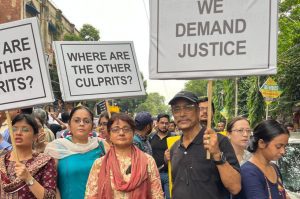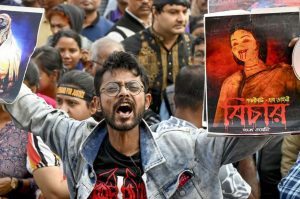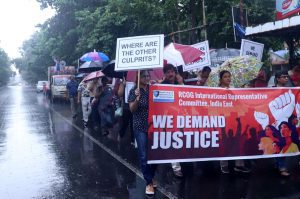Rakhi Bond Protest Unites: Amid the chants, placards, and unwavering voices of dissent, the protesters at the Abhaya Mancha on Wednesday observed Raksha Bandhan in a way that went far beyond ritual. The festival, traditionally celebrating the bond between siblings, became an emotional platform for those who have been camping at the Mancha for months, seeking justice for women and demanding systemic change.
Many of the participants, mostly women, tied rakhis on each other’s wrists not merely as a symbolic gesture of siblinghood, but as a declaration of solidarity against gender-based violence. For some, it was a reminder of protection and unity; for others, it was a poignant day marked by the absence of their families—especially parents—who could not join them in person.

Emotional Moments at the Mancha
The day began quietly, with small groups gathering in the early morning. Protesters decorated parts of the site with marigold garlands, handmade posters, and rakhis bearing slogans like “Justice is the strongest protection” and “We tie not threads, but promises.”
Several women admitted to feeling a deep ache from missing the presence of their parents, who might have been part of such celebrations in normal times. “I haven’t been home for weeks,” said one participant. “My parents support my cause, but they worry for my safety here. Still, on this day, I feel their blessings.”
Rakhi as Protest Symbol
The tying of rakhis became an act of political and social significance. Many protesters framed the festival as an opportunity to redefine protection—not as an act of charity from men toward women, but as a mutual pledge among equals to stand against injustice.
“We are all brothers and sisters in this fight,” said one college student, handing out rakhis made from recycled fabric. “This is not about asking for protection from those in power; it’s about committing to protect one another, no matter who we are or where we come from.”


Stories of Shared Pain and Resolve
As the sun climbed, the Mancha filled with quiet conversations and recollections. One woman recounted losing her sister to violence years ago, a trauma that propelled her into activism. Another spoke of surviving harassment in her workplace, and how the support network at Abhaya Mancha gave her the courage to take legal action.
For many, Raksha Bandhan was also about building a chosen family. Protesters shared food, sang songs of resistance, and tied rakhis not only to fellow demonstrators but also to journalists, volunteers, and bystanders who had stood by them during their movement.
Political Context and Broader Significance
The Abhaya Mancha has, over the past year, become a focal point for protests against gender violence in Bengal. The movement began as a reaction to high-profile incidents but has since evolved into a sustained call for institutional reforms—demanding better policing, faster legal processes, and more comprehensive victim support systems.
Observers note that blending cultural festivals with protest is not new in India, but this year’s Raksha Bandhan at the Mancha carried heightened symbolism. In a climate where dissent often faces suppression, using a festival rooted in familial love as a platform for political expression added a deeply human layer to the movement.
Missing Families, Finding New Bonds
The absence of families was a recurring theme. Many protesters described making phone calls to parents and siblings, tying “virtual rakhis” via video calls, and receiving blessings from afar. A few even shared stories of estrangement, where family members disagreed with their activism.
“This Rakhi, my parents aren’t here physically,” one woman said, “but I am surrounded by people who stand for the same values I was raised with—truth, justice, and compassion. That makes this Rakhi meaningful.”
Rakhi Bond Protest Unites: A Festival Redefined
By dusk, as candles lit up the Mancha, the day closed on a note of resilience. Protesters spoke of the rakhis as reminders that their fight was a shared one—that they were bound not just by threads, but by an enduring commitment to protect each other from injustice.
In the words of a senior activist: “Traditions like Rakhi remind us that love and protection can transcend blood relations. Here at Abhaya Mancha, we have tied ourselves into a bond of purpose—one that will not break until justice is done.”


External References:
- Raksha Bandhan – Cultural Context and History
- Gender Justice Movements in India
- Citizen-Led Protests in Democratic Movements
Also read: Home | Channel 6 Network – Latest News, Breaking Updates: Politics, Business, Tech & More

